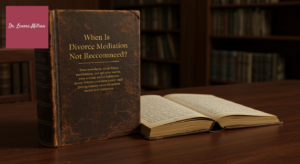When it comes to strengthening or saving a relationship, many couples consider professional help. Marriage counseling and couples therapy are two of the most common approaches, but they are often misunderstood or used interchangeably. While both aim to address relationship struggles and improve communication, they are not exactly the same. Understanding the distinction between marriage and couples counseling can help couples make an informed decision about the best path to take for their relationship.
What Is Marriage Counseling?
Marriage counseling is typically focused on resolving issues within the marriage itself, often with an emphasis on the bond between partners and their shared life. It is a type of therapy designed to help couples address specific problems in their relationship, such as communication issues, trust violations, or disagreements about major life decisions. Marriage counseling often explores past events, patterns of behavior, and the emotional dynamics between partners to improve the relationship moving forward.
A marriage counselor is often trained in specific techniques aimed at repairing and strengthening a marriage. This may include working through conflicts, reestablishing emotional intimacy, and finding healthy ways to interact. Marriage counseling can be an effective approach for couples who are facing particular problems or challenges that impact their marriage and need targeted support to resolve them.
What Is Couples Therapy?
Couples therapy, on the other hand, is a more general term for therapy that helps couples navigate and resolve relationship issues. While marriage counseling focuses specifically on married couples, couples therapy can be beneficial for any relationship, whether married or not. Couples therapy may address a wide variety of issues, including communication problems, infidelity, emotional distance, and more.
A key aspect of couples therapy is its emphasis on fostering healthier communication patterns. The therapist works with both individuals in the relationship to help them understand each other’s needs, emotions, and perspectives. Unlike marriage counseling, which may focus more on the marital contract, couples therapy tends to take a broader view of the relationship, encompassing both the individual and shared experiences of each partner. Couples therapy often delves deeper into each individual’s personal histories, emotional needs, and behavioral patterns to facilitate positive changes in the relationship.
Key Differences Between Marriage Counseling and Couples Therapy
While both marriage counseling and couples therapy can help address relationship issues, there are notable differences between the two approaches. One of the main distinctions is the scope of the therapy. Marriage counseling typically focuses on the issues specific to marriage, such as resolving conflict, strengthening the emotional bond, or improving intimacy within the marital framework. In contrast, couples therapy looks more broadly at the dynamics between partners and the external factors that may influence the relationship.
Additionally, marriage counseling often assumes that the partners are committed to the marriage and want to work things out, whereas couples therapy may be more open to exploring whether the relationship is salvageable or whether the partners should go their separate ways. Marriage counseling is often ideal for couples who want to reignite their connection or overcome a specific issue, while couples therapy can address a wider array of concerns, whether the relationship is married or not.
Does Marriage Counseling Work?
One of the most frequently asked questions when it comes to marriage counseling is whether it works. The success of marriage counseling largely depends on the commitment of both partners and the quality of the therapy itself. Many couples who are actively engaged in the process find that marriage counseling works by providing them with the tools to communicate more effectively, resolve conflicts, and reestablish emotional intimacy. However, it is important to note that marriage counseling is not a quick fix, and results can take time. Some couples may find that the relationship is beyond repair despite counseling, while others may experience significant improvement.
The effectiveness of marriage therapy often hinges on the willingness of both partners to actively participate in the process. Both partners must be open to self-reflection, be willing to listen to each other’s needs, and be committed to making necessary changes for the relationship to thrive. In cases where both partners are invested in the process, marriage counseling can be an incredibly effective way to rebuild a relationship and foster long-lasting change.
When Should You Seek Marriage and Relationship Counseling?
Marriage and relationship counseling is often sought when there are clear signs of trouble in the relationship. This could include issues like persistent arguments, lack of communication, infidelity, emotional disconnection, or unmet needs. Couples may seek counseling when they realize that their typical conflict-resolution strategies are no longer effective or when they are struggling to reconnect emotionally.
Counseling for couples can also be helpful even if the relationship isn’t facing a crisis but instead needs preventative care. Couples therapy and marriage counseling are valuable tools for partners who want to strengthen their relationship and ensure long-term happiness. Seeking help early on can provide couples with a better understanding of their relationship dynamics and equip them with the skills needed to navigate future challenges.
When to Choose Couples Therapy Over Marriage Counseling
Couples therapy may be the right option for couples who are not married or those who are dealing with deeper psychological issues that are affecting the relationship. For example, couples therapy might be beneficial if there are concerns about individual mental health issues, past trauma, or personal struggles that are impacting the relationship. Unlike marriage counseling, which is typically focused on the marital bond, couples therapy is more about understanding each person’s personal challenges and how those challenges impact their ability to relate to each other.
If the couple is facing complex issues such as addiction, mental health problems, or unresolved trauma, couples therapy can provide a comprehensive approach by working through both individual and shared concerns. Couples therapy may also be a better fit for couples who are uncertain about the future of their relationship or who are trying to understand if they want to stay together long-term.
Conclusion
Whether you choose marriage counseling or couples therapy, the goal remains the same: improving your relationship and fostering a deeper, more fulfilling connection with your partner. Both approaches offer valuable insights and strategies for addressing relationship issues, but they differ in their scope and focus. While marriage counseling is ideal for couples committed to repairing their marriage, couples therapy provides a broader approach that can assist partners in any type of committed relationship. For those seeking guidance in Connecticut and New Jersey, marriage counseling services such as those offered at Marriage Counseli ng CT NJ can provide the support needed to navigate and resolve relationship challenges. Whatever your path, professional help can provide the necessary tools and strategies to strengthen your bond, improve communication, and foster a more connected, resilient partnership.



